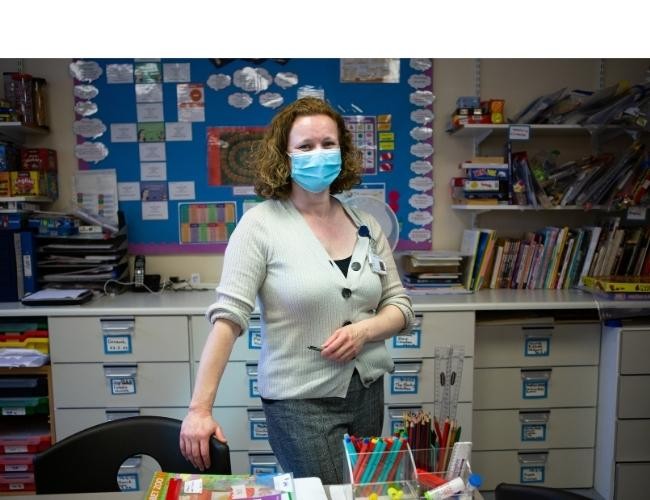Our children and young people’s occupational therapy service works to enable people to participate in daily activities/occupations to improve their health, independence and wellbeing.
Occupations for children or young people may include self-care (dressing, eating a meal, using the toilet, making a simple meal), being productive (participating in activities and routines at nursery or school, or volunteering), and leisure (playing with friends, doing sports or hobbies).
Occupational therapists can help babies, children and young people who may need support and advice if they are not able to do daily occupations due to illness, disability, family circumstances, or as a result of changes as they get older.
Occupational therapists support the child or young person, their family and other relevant people such as teachers, to evaluate challenges and strengths in doing daily activities. This service usually occurs within the child’s natural environment (home, school or other relevant community settings), although specialist assessments may also take place in a clinic.
The occupational therapy service works with babies, children and young people from birth to 18 years or school leaving age, who live in or attend school in the London Borough of Camden or are registered with a GP in the London Borough of Camden. Referrals are accepted from parents, and health and education professionals.
A referral to the service will be considered when there is a concern regarding the child's or young person’s ability to participate in play/leisure, self-care/independence or participation in school life.
For school-aged children, the referral form must identify at least two functional concerns, such as difficulty moving around their environment, difficulty with everyday tasks and activities at home or school such as using cutlery or dressing, difficulty in participating in PE lessons or other activities such as riding their bike, difficulty handling play items or using school tools and materials.
The referral needs to specify how the difficulties impact on the child/young person's ability to perform daily activities (eg because of difficulties with dressing, the child misses the beginning of PE lessons; because of difficulties handling toys, the child is delayed in their play and self-care skills; because the young person cannot access the toilet in the school they cannot attend a whole day).
Please note that referrals are not accepted that state ‘fine motor difficulties’, ‘sensory processing difficulties’, or mention just a diagnosis. Referrals are not accepted for handwriting difficulties where no other functional concerns are identified.
Referrals will also be accepted for babies and young children identified at high risk of developmental delays in motor, sensory or cognitive areas for assessment and early intervention, if indicated.
Please use the online single point of referral form.
The occupational therapy service for children and young people in Camden works with children, families and schools in Camden to promote health and wellbeing through engaging in meaningful activities and occupations to promote independence and participation in all areas of everyday life.
Occupation and participation for children and young people may include self-care (for example getting ready to go out, eating a meal, using the toilet), being actively involved and productive at school (for example in the classroom with school work, playing and PE lessons), and leisure (for example playing with friends, socialising with friends, doing hobbies or sports).
Read about the Camden Local Offer on the London Borough of Camden website.
The child development team (CDT) is a multidisciplinary team for children aged under five with more significant developmental/health needs. The multidisciplinary team includes occupational therapists, paediatricians, physiotherapists, speech and language therapists and a specialist health visitor. As the CDT is part of the integrated service for disabled children (also called MOSAIC), the service works very closely with the disabled children’s team of social workers and CAMHS (child and adolescent mental health services).
A multidisciplinary assessment of your child’s development and functional needs will be undertaken, of which the occupational therapist is a part. Areas which your occupational therapist may assess include:
- movement skills as applied to childhood activities
- self-help skills such as feeding, dressing and toileting
- play ability
- responses to sensory information
- pre-school/nursery related skills
Sessions can be offered in clinics based at Kentish Town Health Centre, the home environment, as well as nursery and other community settings. Interventions can include:
- direct coaching and ‘modelling’ sessions with the occupational therapist
- home and nursery programmes to integrate treatment activities and strategies into real life situations
- consultation and training for parents and nursery staff
- regular reviews of the child’s progress
- supporting young children as they start at nursery and supporting nursery staff to manage the child’s specific needs.
- providing equipment at home and in nursery, working closely with social care occupational therapists to address any housing, equipment and adaptation needs.
The children’s social care occupational therapy service (SCOT) is for children and young people (aged 0-18 years) with a condition that has an impact on their day-to-day life related to functional ability and independence at home, for example those who need housing adaptations or special equipment as a result of their condition.
The occupational therapist will assess the child’s needs and may carry out assessments to try out pieces of equipment and then order and provide any necessary equipment. As the child grows and their needs change, this equipment may need to be reviewed, modified and replaced.
The service can provide support with:
- accessing showering/bathing/toileting facilities
- transferring safely (eg bed to chair, chair to toilet)
- postural care in order to enable safe and/or independent feeding/toileting/bathing
- access to the appropriate equipment to support their condition (eg profiling bed, shower chair, specialist seating system)
- access to the home environment
The service cannot support with:
- re-housing (our service does not have any authority in arranging re-housing for families; please contact the Camden re-housing service)
- requests for sensory equipment (please email us to request a list of charities who may be willing to fund sensory equipment)
- garden adaptations (unless it is related to access)
- equipment for safety issues or needs related to behavioural difficulties, for example window locks or stair gates
The occupational therapy service for children and young people provides assessment, direct therapy and an advisory service for children from birth until they leave school or college.
Find out more about our Mainstream schools and community occupational therapy service.
Occupational therapists provide assessments and intervention within the context of the school environment the student attends.
Assessments are carried out by observing the student in the classroom and playground, interacting and engaging in activities with the student, and obtaining information from parents and the teaching staff. Appropriate formal (standardised) assessments may be used.
Occupational therapists provide interventions in the following areas:
- self-care occupations such as dressing, toileting, and using cutlery
- life skills such as preparing a meal
- play/leisure such as cycling and using the playground equipment
- use of classroom tools such as scissors, keyboard, pencil
- specialist equipment needs (hoists, slings, seating, adapted cutlery/pens, etc)
- digital assistive technology and alternative and augmentative communication
Children and young people living in Camden can be referred to specialist occupational therapy services as required.
Find out more about specialist occupational therapy services.
Read more about occupational therapy services for children and young people from the College of Occupational Therapists.
Watch videos on Occupational Therapy for Children and Young People on Vimeo.
 Translate
Translate



